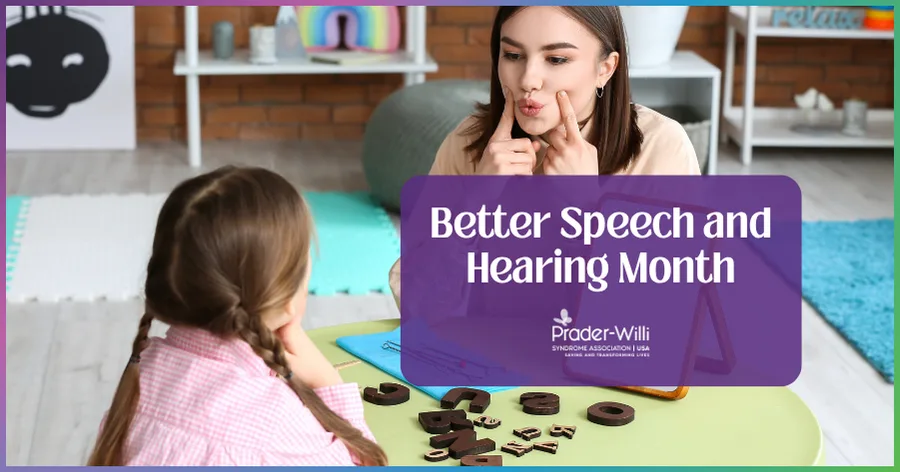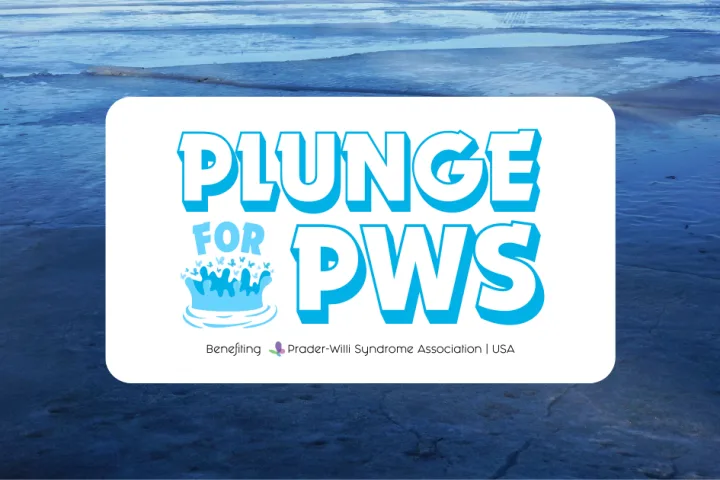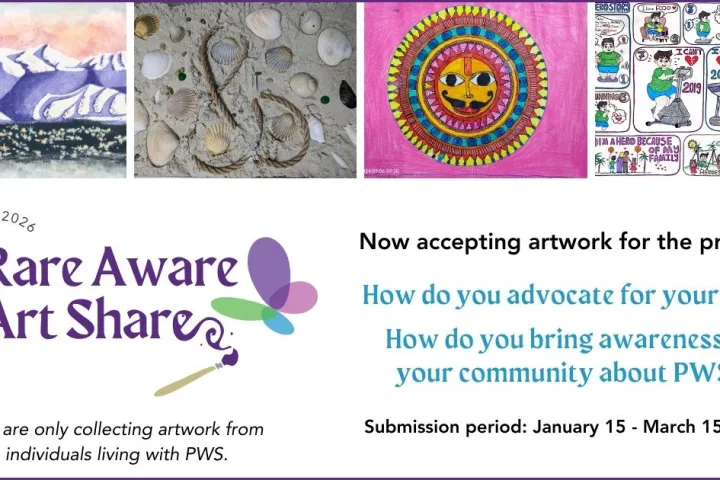The month of May is recognized as Better Speech and Hearing Month to bring awareness to the many speech, language, swallowing and hearing disorders among children and adults.
Individuals with PWS often present with a variety of clinical features that may impact their speech and language development (Lewis, 2023) including reduced articulation, hypernasality or hypo nasality, slow rate of speech, delayed receptive / expressive language, poor pragmatic skills, and imprecise articulation (Lewis, 2023).
Children with PWS may also have apraxia of speech, a speech-sound disorder that results from the motor programming of sound production (Lewis, 2023). Some individuals with PWS may not produce intelligible speech sounds until they are school age. Many students utilize augmentative communication (e.g., programmed iPads, American sign language, low tech communication boards) to communicate while they are developing their language, vocabulary, and oral speech skills. Expressive and receptive language functioning is typically much lower than verbal IQ.
Speech and Language Pathologists (SLP) are integral members of the multidisciplinary team treating individuals with PWS. Their goal is to help a person with PWS become a more functional communicator. Speech therapy is beneficial as early as infancy and continues to add benefit through adulthood. In infancy, the focus will be on oral-motor therapy, strengthening the muscles used for speech and feeding. While parents can help stimulate language development and growth, a trained SLP is needed to help individuals achieve their full potential. May 18th is SLP Appreciation Day, so be sure to show your appreciation to the SLPs on your team!
References
Lewis, Barbara (2023). Speech and Language Disorders Associated with Prader-Willi Syndrome. Butler, Merlin G., Lee, Phillip D.K., Whitman, Barbara Y. Management of Prader-Willi Syndrome 3rd Edition (pp 272-283). Springer.





 Perry A. Zirkel has written more than 1,500 publications on various aspects of school law, with an emphasis on legal issues in special education. He writes a regular column for NAESP’s Principal magazine and NASP’s Communiqué newsletter, and he did so previously for Phi Delta Kappan and Teaching Exceptional Children.
Perry A. Zirkel has written more than 1,500 publications on various aspects of school law, with an emphasis on legal issues in special education. He writes a regular column for NAESP’s Principal magazine and NASP’s Communiqué newsletter, and he did so previously for Phi Delta Kappan and Teaching Exceptional Children. Jennifer Bolander has been serving as a Special Education Specialist for PWSA (USA) since October of 2015. She is a graduate of John Carroll University and lives in Ohio with her husband Brad and daughters Kate (17), and Sophia (13) who was born with PWS.
Jennifer Bolander has been serving as a Special Education Specialist for PWSA (USA) since October of 2015. She is a graduate of John Carroll University and lives in Ohio with her husband Brad and daughters Kate (17), and Sophia (13) who was born with PWS. Dr. Amy McTighe is the PWS Program Manager and Inpatient Teacher at the Center for Prader-Willi Syndrome at the Children’s Institute of Pittsburgh. She graduated from Duquesne University receiving her Bachelor’s and Master’s degree in Education with a focus on elementary education, special education, and language arts.
Dr. Amy McTighe is the PWS Program Manager and Inpatient Teacher at the Center for Prader-Willi Syndrome at the Children’s Institute of Pittsburgh. She graduated from Duquesne University receiving her Bachelor’s and Master’s degree in Education with a focus on elementary education, special education, and language arts. Evan has worked with the Prader-Willi Syndrome Association (USA) since 2007 primarily as a Crisis Intervention and Family Support Counselor. Evans works with parents and schools to foster strong collaborative relationships and appropriate educational environments for students with PWS.
Evan has worked with the Prader-Willi Syndrome Association (USA) since 2007 primarily as a Crisis Intervention and Family Support Counselor. Evans works with parents and schools to foster strong collaborative relationships and appropriate educational environments for students with PWS. Staci Zimmerman works for Prader-Willi Syndrome Association of Colorado as an Individualized Education Program (IEP) consultant. Staci collaborates with the PWS multi-disciplinary clinic at the Children’s Hospital in Denver supporting families and school districts around the United States with their child’s Individual Educational Plan.
Staci Zimmerman works for Prader-Willi Syndrome Association of Colorado as an Individualized Education Program (IEP) consultant. Staci collaborates with the PWS multi-disciplinary clinic at the Children’s Hospital in Denver supporting families and school districts around the United States with their child’s Individual Educational Plan. Founded in 2001, SDLC is a non-profit legal services organization dedicated to protecting and advancing the legal rights of people with disabilities throughout the South. It partners with the Southern Poverty Law Center, Protection and Advocacy (P&A) programs, Legal Services Corporations (LSC) and disability organizations on major, systemic disability rights issues involving the Individuals with Disabilities Education Act (IDEA), Americans with Disabilities Act (ADA), and the federal Medicaid Act. Recently in November 2014, Jim retired.
Founded in 2001, SDLC is a non-profit legal services organization dedicated to protecting and advancing the legal rights of people with disabilities throughout the South. It partners with the Southern Poverty Law Center, Protection and Advocacy (P&A) programs, Legal Services Corporations (LSC) and disability organizations on major, systemic disability rights issues involving the Individuals with Disabilities Education Act (IDEA), Americans with Disabilities Act (ADA), and the federal Medicaid Act. Recently in November 2014, Jim retired.